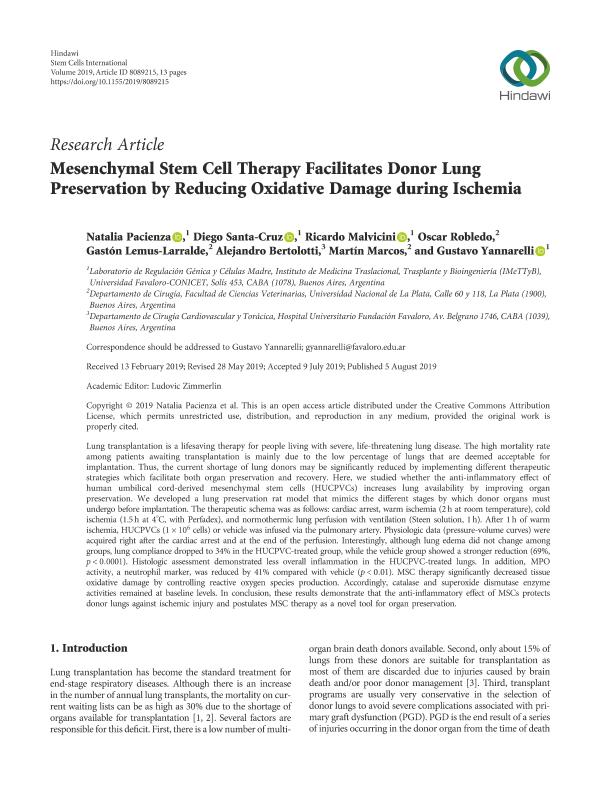Artículo
Mesenchymal stem cell therapy facilitates donor lung preservation by reducing oxidative damage during ischemia
Pacienza, Natalia; Santa Cruz, Diego Mario ; Malvicini, Ricardo
; Malvicini, Ricardo ; Robledo, Oscar; Lemus Larralde, Gastón; Bertolotti, Alejandro Mario; Marcos, Martín; Yannarelli, Gustavo Gabriel
; Robledo, Oscar; Lemus Larralde, Gastón; Bertolotti, Alejandro Mario; Marcos, Martín; Yannarelli, Gustavo Gabriel
 ; Malvicini, Ricardo
; Malvicini, Ricardo ; Robledo, Oscar; Lemus Larralde, Gastón; Bertolotti, Alejandro Mario; Marcos, Martín; Yannarelli, Gustavo Gabriel
; Robledo, Oscar; Lemus Larralde, Gastón; Bertolotti, Alejandro Mario; Marcos, Martín; Yannarelli, Gustavo Gabriel
Fecha de publicación:
08/2019
Editorial:
Hindawi Publishing Corporation
Revista:
Stem Cells International
ISSN:
1687-9678
Idioma:
Inglés
Tipo de recurso:
Artículo publicado
Clasificación temática:
Resumen
Lung transplantation is a lifesaving therapy for people living with severe, life-threatening lung disease. The high mortality rate among patients awaiting transplantation is mainly due to the low percentage of lungs that are deemed acceptable for implantation. Thus, the current shortage of lung donors may be significantly reduced by implementing different therapeutic strategies which facilitate both organ preservation and recovery. Here, we studied whether the anti-inflammatory effect of human umbilical cord-derived mesenchymal stem cells (HUCPVCs) increases lung availability by improving organ preservation. We developed a lung preservation rat model that mimics the different stages by which donor organs must undergo before implantation. The therapeutic schema was as follows: cardiac arrest, warm ischemia (2h at room temperature), cold ischemia (1.5h at 4°C, with Perfadex), and normothermic lung perfusion with ventilation (Steen solution, 1h). After 1h of warm ischemia, HUCPVCs (1x106 cells) or vehicle were infused via the pulmonary artery. Physiologic data (pressure-volume curves) were acquired right after the cardiac arrest and at the end of the perfusion. Interestingly, although lung edema did not change among groups, lung compliance dropped a 34% in the HUCPVCs-treated group, while the vehicle group showed a stronger reduction (69%, p<0.0001). Histologic assessment demonstrated less overall inflammation in HUCPVCs-treated lungs. In addition, MPO activity, a neutrophil marker, was reduced by 41% compared with vehicle (p<0.01). MSCs therapy significantly decreased tissue oxidative damage by controlling reactive oxygen species production. Accordingly, catalase and superoxide dismutase enzyme activities remained at baseline levels. In conclusion, these results demonstrate that the anti-inflammatory effect of MSCs protects donor lungs against ischemic injury and postulate MSCs therapy as a novel tool for organ preservation.
Archivos asociados
Licencia
Identificadores
Colecciones
Articulos (IMETTYB)
Articulos de INSTITUTO DE MEDICINA TRASLACIONAL, TRASPLANTE Y BIOINGENIERIA
Articulos de INSTITUTO DE MEDICINA TRASLACIONAL, TRASPLANTE Y BIOINGENIERIA
Citación
Pacienza, Natalia; Santa Cruz, Diego Mario; Malvicini, Ricardo; Robledo, Oscar; Lemus Larralde, Gastón; et al.; Mesenchymal stem cell therapy facilitates donor lung preservation by reducing oxidative damage during ischemia; Hindawi Publishing Corporation; Stem Cells International; 2019; 8-2019; 1-14
Compartir
Altmétricas



